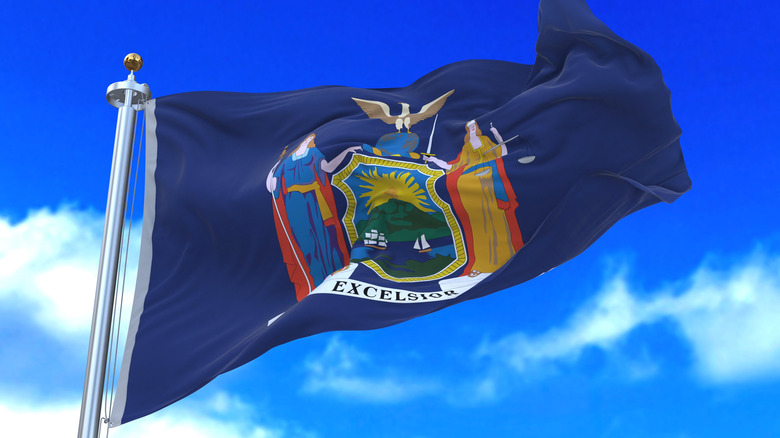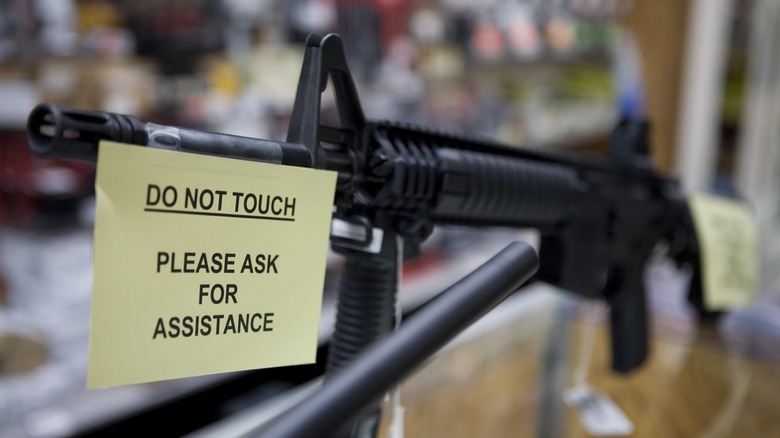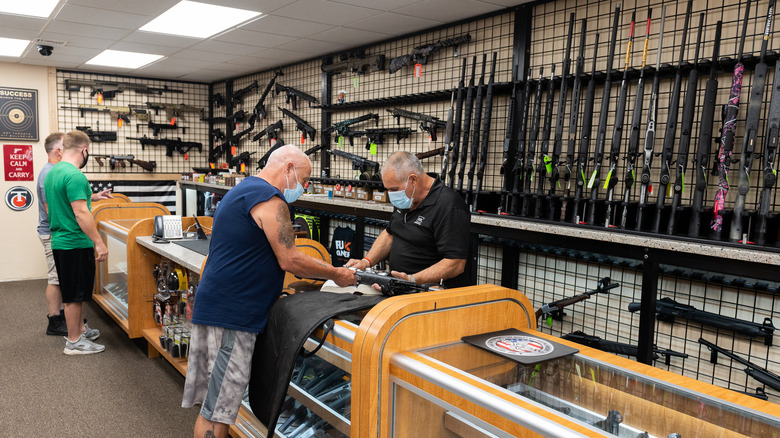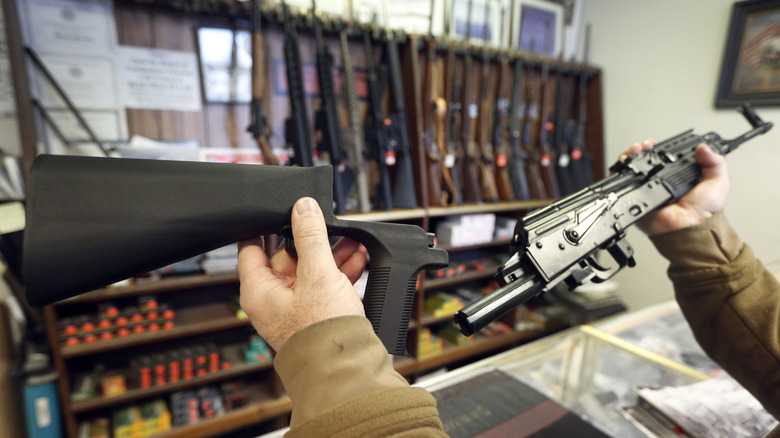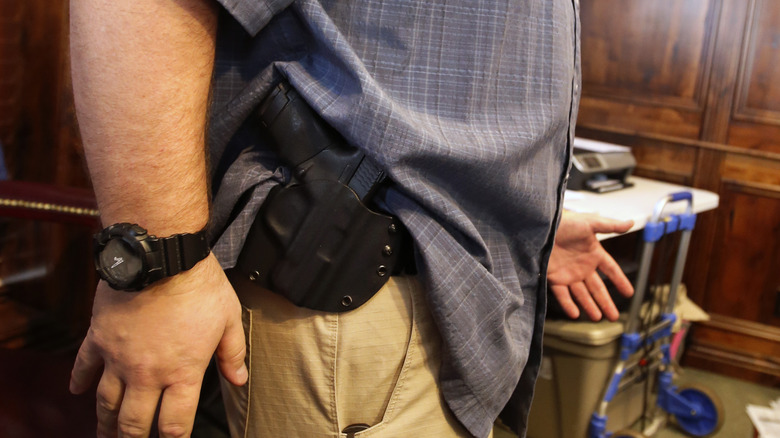These Are The Gun Laws In The State Of New York
New York state is known to have some of the tightest gun laws in the United States. The state even received an A- grade from the Giffords Law Center — an organization started by former Congresswoman Gabrielle Giffords to combat gun violence — which has resulted in the 6th highest ranking in the nation for gun safety, per the organization's standards. The Giffords Law Center notes 5.3 gun deaths in New York per 100,000 people which is 61% below the national average.
In 2013, then-Governor Andrew Cuomo signed the Secure Ammunition and Fire Arm Enforcement Act — commonly known as the SAFE Act — into law. This introduced a slew of new regulations for gun ownership. According to the SAFE Act website, the act "criminals and the dangerously mentally ill from buying guns, cracks down on illegal guns, and bans only the most dangerous assault weapons." At the same time, it also mentions provisions that are intended to defend and maintain New Yorker's Second Amendment rights. As of 2021, bills seeking to change aspects of the SAFE Act, in particular, its ban on large-capacity magazines and similar devices, have been making their way through the state legislature, with the point of legalizing them at firing ranges (via The New York State Senate).
New York's gun laws are not just known for being stringent, they're also known for being complicated. The laws regarding purchasing firearms vary between different types of weapons, while New York City even has its own set of laws and regulations, according to Brill Legal Group.
Gun Ownership
According to FindLaw, a firearm license is required to own a handgun in the state of New York. Additionally, those who obtain the license must then continue to adhere to the licensing requirements. Those guilty of "serious offenses" are prohibited from owning any kind of firearm. The state defines serious offenses as any of a laundry list of criminal offenses that range from illegal weapons possession to obscenity in the third degree to criminal possession of a hypodermic needle, per The New York State Senate. Additionally, a doctor or director of a mental hospital or institution can designate someone as unsuitable for firearm ownership.
While buying and selling assault weapons is illegal in New York, owning them is not according to the SAFE Act. Owners are required to have their assault weapons registered with the New York State Police, and those prohibited from owning firearms under federal law are not permitted to register. Most common weapons including hunting rifles do not fall under the state's definition of an assault rifle. If a gun owner has an assault rifle they are allowed to make modifications to it so that it no longer is considered as such, however, those modifications must be permanent.
Gun sales
As previously mentioned, assault weapons are not allowed to be bought or sold in the Empire State according to the SAFE Act website. All gun sales and transfers involving handguns, rifles, and shotguns require a background check to be run on the buyer, though there are exceptions made for sales and transfers between certain family members including spouses, domestic partners, and children and step-children. Even if the sale is between two private individuals they must have the background check performed by going to an authorized dealer. The dealer will handle the background check as specified by Federal guidelines and there is a fee involved, but the dealer may not charge more than $10 for this service. According to Giffords Law Center, transfers of any kind require notifying the State Police in writing. However, in New York City or Nassau and Suffolk counties on Long Island, a proper licensing officer in those areas can be contacted instead.
Antique firearms also have their own rules and regulations when being bought and sold. Any gun manufactured more than 50 years ago is considered antique, however, if it meets the criteria of an assault weapon or has a magazine that can hold more than ten rounds it must be registered with the State Police. Additionally, it's against state law for anyone other than a gunsmith or authorized dealer to dispose of a firearm.
Accessories
New York has limits on the capacity of acceptable magazines. Any magazine with a capacity of up to 10 rounds is acceptable. With the passage of the SAFE Act in 2013, gun owners were permitted to modify higher-capacity magazines to meet the 10-round limit, though this had to be completed by January 15, 2014. After that date, such magazines were required to be disposed of, transferred to the possession of law enforcement officials, or sold to a buyer outside of New York.
According to The New York State Senate, the state legislature outlawed ghost guns in 2021. A ghost gun is a gun that was modified with aftermarket pieces and accessories. These modifications are untraceable which allows them to skirt past some of the state's requirements for purchases and transfers.
Another accessory that made headlines after the 2017 Las Vegas mass shooting is bump stocks. A bump stock is a device that can be fitted to a semi-automatic rifle that allows it to fire rapidly like a fully-automatic weapon. According to PolitiFact, former Governor Andrew Cuomo stated about a week after the shooting in Las Vegas that bump stocks were illegal in New York. He was correct in that using them has been outlawed for decades, but there was no law about buying and selling them. This discrepancy was rectified in 2019 when a bill was passed that put in place a state-wide ban on buying and selling bump stocks, per Newsday.
Open versus concealed carry
In New York, concealed carry is permitted but a license must be obtained for this to be considered legal. Open carry of handguns is not permitted at all, however, the state doesn't have any laws against openly carrying long guns. Someone looking to obtain a concealed carry license has to be over 21 years old (although this doesn't apply to those who have been honorably discharged from the military) and considered to be "of good moral character," per FindLaw. There are quite a few other requirements, though it's worth noting that with many of them, a candidate who wouldn't meet those criteria wouldn't be able to legally own a gun in the first place.
According to U.S. Concealed Carry, New York is considered a may-issue state, meaning that concealed carry licenses are distributed based on a series of requirements as previously stated, but applicants can be denied at the discretion of whoever is issuing the licenses, often county sheriffs or the court system.
